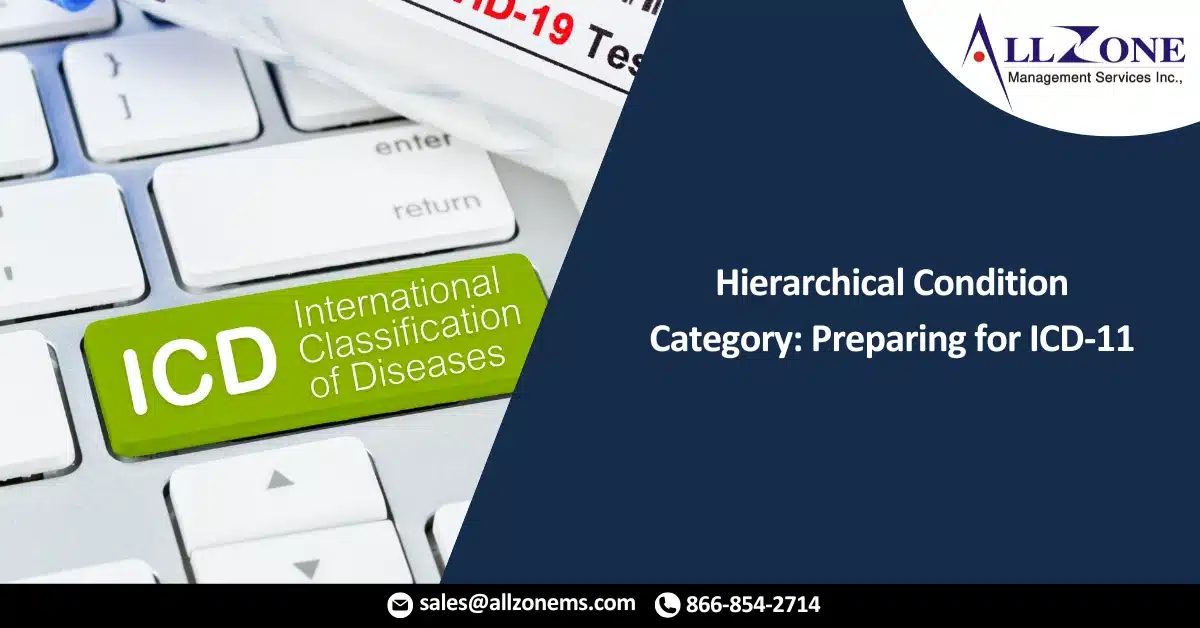HCCs thrive on specificity and ICD-11 will provide a higher level of specificity than in ICD-10.
For those of you who are HCC coding for hierarchical condition category (HCC) purposes, you know that HCCs are categories of related ICD-10 codes. Only selected significant conditions to drive a payment HCC coding. That means only conditions that present at a high enough frequency to predict long-term costs of care and are specific enough, are included in those payment categories. The HCC payment categories only include approximately 10,000 of the 70,000+ ICD-10 codes. Many unspecified conditions are excluded from the payment HCCs.
The Centers for Medicare & Medicaid Services (CMS) has built its algorithms based in part on the codes submitted on claims to drive this reimbursement methodology. We all know that validating CMS data takes time, which means when ICD-11 kicks in, a whole new algorithm may be needed. But let’s table that thought momentarily.
HCCs thrive on specificity, and ICD-11 will definitely provide that. ICD-11 is designed as an electronic health record (EHR)-compatible database that will link with the Systematized Nomenclature of Medicine – Clinical Terms (SNOMED-CT) (Stearns 2016), which is already a component of many of our EHRs.
Structurally, the ICD-11 code differs from the ICD-10 format and utilizes a suffixing approach to add attributes to the stem or foundation code. An example of a stem code is type 1 diabetes. Other codes are appended to the stem to describe the disease, such a Type 1 DM with diabetic retinopathy. By using additional “X” extension codes, the final HCC coding will capture specificity for laterality, severity, present-on-admission status, morphology, anatomy, or whether the condition is related to the patient’s family history.
Because ICD-11 is built on SNOMED-CT and embedded in the EHR, we will be able to use SNOMED’s artificial intelligence (AI) deciphering capability to determine whether conditions are symptoms or manifestations, what the stage of condition is, whether it’s related to a substance or organism, or whether it’s associated with an event, among other attributes. SNOMED’s vast medical vocabulary is capable of “reading” the clinician entries and interpreting clinical expressions (e.g., “doubtful encephalopathy.”)
So, in essence, ICD-11, with its 55,000 codes, plus SNOMED-CT’s 300,000 concepts is ICD-10 on steroids! So, let’s circle back to HCCs, and ICD-11’s impact on them. CMS is intimately involved in the World Health Organization’s implementation of ICD-11. CMS built its algorithm on what was submitted on claims. It is very likely that CMS’s team of analysts have already begun to use (or soon will be using) SNOMED and other tools to convert their extensive database of ICD-10 codes to ICD-11. So we need to give them credit for thinking ahead.
But what has been happening to those SNOMED codes we have been capturing in our EHRs, in those problem lists? Are we data mining those codes and mapping them to payment HCCs? Can we use our own data and map to ICD-11 to see what the impact may be on our organization’s pool of HCC revenues? It may be challenging, but ICD-11, in its current version, is available for us to explore.
If we think about the timeline for ICD-11 in the U.S., there is also adequate time for AI to become quite sophisticated in our EHRs. AI will be scouring digital documentation, seeking to surface potential codes for assessment by our HCC coding professionals, and facilitating the linking of the stems to the attribute codes.
However, AI can scour all it wants, but it, like our HCC coding, requires documentation – and the looming question remains, at this time, unanswered: will the documentation rise to meet the specificity level that can be captured under ICD-11, and with SNOMED? I’m not a gambler, but this is a sure bet…it won’t!
That means there will be abundant opportunities for clinical documentation improvement activities. But to understand what we will need means that our HCC coding and clinical documentation integrity (CDI) staff must understand ICD-11. Go to the World Health Organization’s site and start learning. Don’t wait until it’s at our doorstep.
For More Information: https://www.icd10monitor.com/hcc-coding-preparing-for-icd-11

